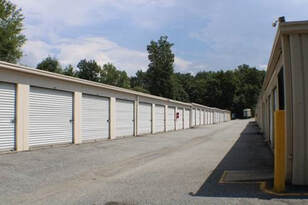Storage units near me in Salisbury NC: Timeline for when items are auctioned for nonpayment8/25/2023  Storage units near me are ideal for storing items safely Storage units near me in Salisbury NC can store your items safely but you’ll need to uphold your contract end to prevent getting auctioned. Self-storage facilities provide a convenient solution for individuals and businesses to store their belongings securely. However, in cases of nonpayment, these facilities have the legal right to auction off the stored items to recover their losses. If you find yourself unable to make payments on your storage unit, it's important to understand the timeline and processes involved before your belongings are auctioned off. Initial Grace Period: When you rent a storage unit, you enter into a contractual agreement with the facility. This agreement typically includes a clause specifying the terms and conditions of payment. In most cases, the rental agreement will grant you a grace period, usually ranging from 7 to 30 days, during which you can catch up on missed payments without any immediate repercussions. Late Notices and Communication: If you fail to make the payment within the grace period, the self-storage facility will usually send you a late notice. This notice serves as a formal communication alerting you to the overdue payment and reminding you of the potential consequences. Some facilities might also attempt to contact you via phone or email to discuss the situation and explore options for payment. Lien and Access Denial: If the payment still remains unpaid after the grace period and the subsequent communication attempts, the self-storage facility can place a lien on your unit. A lien is a legal claim that gives the facility the right to retain possession of your belongings until the outstanding debt is settled. Once a lien is placed, the facility may deny you access to your storage unit until the matter is resolved. Pre-Auction Notifications: Before auctioning off your belongings, most self-storage facilities are required by law to send you a written notice of their intent to auction. This notice will include details such as the date, time, and location of the auction, as well as a description of the items to be auctioned. The notice is usually sent through certified mail or a similar method to ensure proper delivery. Auction Process and Legal Requirements: The auction process itself is typically conducted according to state laws and regulations. Public auctions are usually held on-site at the self-storage facility or at a designated auction house. The auctioneer will present each storage unit's contents to potential bidders, and the highest bidder will win the contents of the unit. The proceeds from the auction are used to cover the outstanding debt, late fees, auction costs, and any other related expenses. If the proceeds exceed these costs, the remaining balance may be returned to you. Redemption Period (Varies by Jurisdiction): In some jurisdictions, there might be a redemption period following the auction during which you have the opportunity to reclaim your belongings by paying the outstanding debt and associated fees. However, the duration of this period varies depending on local laws and the terms of the storage facility's rental agreement. Avoiding Auction: Preventive Measures and Tips: While facing an auction of your stored belongings can be stressful, there are steps you can take to prevent reaching this point in the first place:
Legal Considerations and Consumer Rights: It's important to be aware of your rights and the legal processes involved in the event of an auction:
While the prospect of your stored belongings being auctioned off can be unsettling, understanding the timeline and processes involved can help you navigate this situation more effectively. Open communication with the self-storage facility and proactive management of your rental agreement can go a long way in preventing nonpayment and potential auctions. By staying informed about your legal rights and taking preventive measures, you can ensure the safety and security of your belongings while using self-storage facilities to meet your storage needs. Reserve the best storage units near me in Salisbury NC Mr. Storage is locally owned and managed with affordable pricing. We have storage facilities in Concord, Salisbury, Harrisburg, Kannapolis NC, and Midland. Contact us today to reserve your unit.
0 Comments
 Self-storage units can offer space for your car restoration project Self-storage units in Salisbury NC can be ideal for your car restoration project. Car restoration projects can be a rewarding and fulfilling hobby for automotive enthusiasts. However, not everyone has the luxury of having a spacious garage or workshop to undertake such endeavors. In recent years, many car enthusiasts have turned to self-storage units as an alternative solution for their restoration projects. In this article, we will explore the feasibility and legality of working on a car restoration project in a self-storage unit. Benefits of Using a Self-Storage Unit for Car Restoration
Factors to Consider Before Starting Your Project
Tips for Successful Car Restoration in a Self-Storage Unit
Safety Considerations: When undertaking a car restoration project in a self-storage unit, safety should always be a top priority. Here are some essential safety considerations to keep in mind:
Complying with Environmental Regulations: Car restoration projects can generate waste materials such as used oil, paint, and other chemicals. It is crucial to handle and dispose of these materials responsibly and in compliance with environmental regulations.
Reserve self-storage units in Salisbury NC Mr. Storage is locally owned and managed with affordable pricing. We have storage facilities in Concord, Salisbury, Harrisburg, Kannapolis NC, and Midland. Contact us today to reserve your unit.  Storage facilities are perfect storage options for preserving tire health Storage facilities in Salisbury NC can be effective storage for tires. Tires are essential components of vehicles, providing crucial contact between the road and the vehicle. Proper tire maintenance is essential for ensuring safety and extending its lifespan. One common concern for tire owners is the risk of dry rot, a condition caused by the aging and degradation of the rubber over time. In this article, we will explore how to store tires to prevent dry rot, the potential risks of storing tires in self-storage units, and the best practices for storing tires with or without air. How to store tires to prevent dry rot: Choose the right storage location: When considering tire storage, select a cool, dry, and well-ventilated location. Exposure to direct sunlight, extreme temperatures, and high humidity can accelerate the aging process and promote dry rot. A garage or a dedicated storage room are generally ideal choices. Clean the tires before storage: Before storing tires, clean them thoroughly with mild soap and water. Avoid using harsh chemicals or petroleum-based cleaners, as they may damage the rubber. Removing dirt, oils, and road debris helps preserve the tire's integrity during storage. Store tires away from ozone-generating sources: Ozone exposure can speed up the deterioration of rubber compounds, leading to dry rot. Avoid storing tires near electric motors, generators, or other ozone-generating equipment. Use tire covers: Consider using tire covers made of UV-resistant material to shield tires from sunlight and ozone exposure during storage. These covers provide an additional layer of protection and help maintain tire health. Rotate the tires periodically: If you plan to store tires for an extended period, consider rotating them every six months. Rotating the tires helps prevent the formation of flat spots and ensures even wear during storage. Reasons not to store tires in a self-storage unit: While self-storage units may seem like a convenient option for tire storage, there are several reasons to reconsider this choice:
Storing tires with air or without air: Storing tires with air: It is generally recommended to store tires with the manufacturer's recommended air pressure. Properly inflated tires maintain their shape and prevent flat-spotting during storage. Additionally, storing tires with air helps to seal the tire beads and prevent moisture from entering the tire. Storing tires without air: If you choose to store tires without air, stack them horizontally to avoid deformation. Place each tire on a piece of cardboard or plywood to keep them off the ground and prevent contact with oils or solvents. Safety Tips for Storing Tires: Inspect tires before storage: Before storing your tires, give them a thorough inspection. Look for any signs of damage, such as cuts, bulges, or punctures, as these issues can worsen during storage and render the tires unsafe to use later on.
Proper tire storage is crucial for maintaining tire health and safety. Preventing dry rot and other forms of deterioration is achievable by choosing the right storage location, cleaning the tires before storage, using tire covers, and rotating the tires periodically. While self-storage units may seem like a convenient option, they come with risks such as temperature fluctuations, humidity, and lack of sunlight protection, making them less ideal for long-term tire storage. Whenever possible, opt for a cool, dry, and well-ventilated space for storing tires. Whether you decide to store your tires with air or without air, follow the recommended practices to ensure the tires maintain their shape, integrity, and performance when you put them back into service. Remember that tires play a vital role in your vehicle's safety and performance. Always inspect your tires regularly and replace them when necessary, following the manufacturer's guidelines. By taking proper care of your tires, you'll not only enhance their longevity but also contribute to safer and more enjoyable journeys on the road. Reserve storage facilities in Salisbury NCMr. Storage is locally owned and managed with affordable pricing. We have storage facilities in Concord, Salisbury, Harrisburg, Kannapolis NC, and Midland. Contact us today to reserve your unit. |
AuthorThe top self-storage unit location that’s most convenient to you. Archives
June 2024
Categories
All
|
 RSS Feed
RSS Feed
